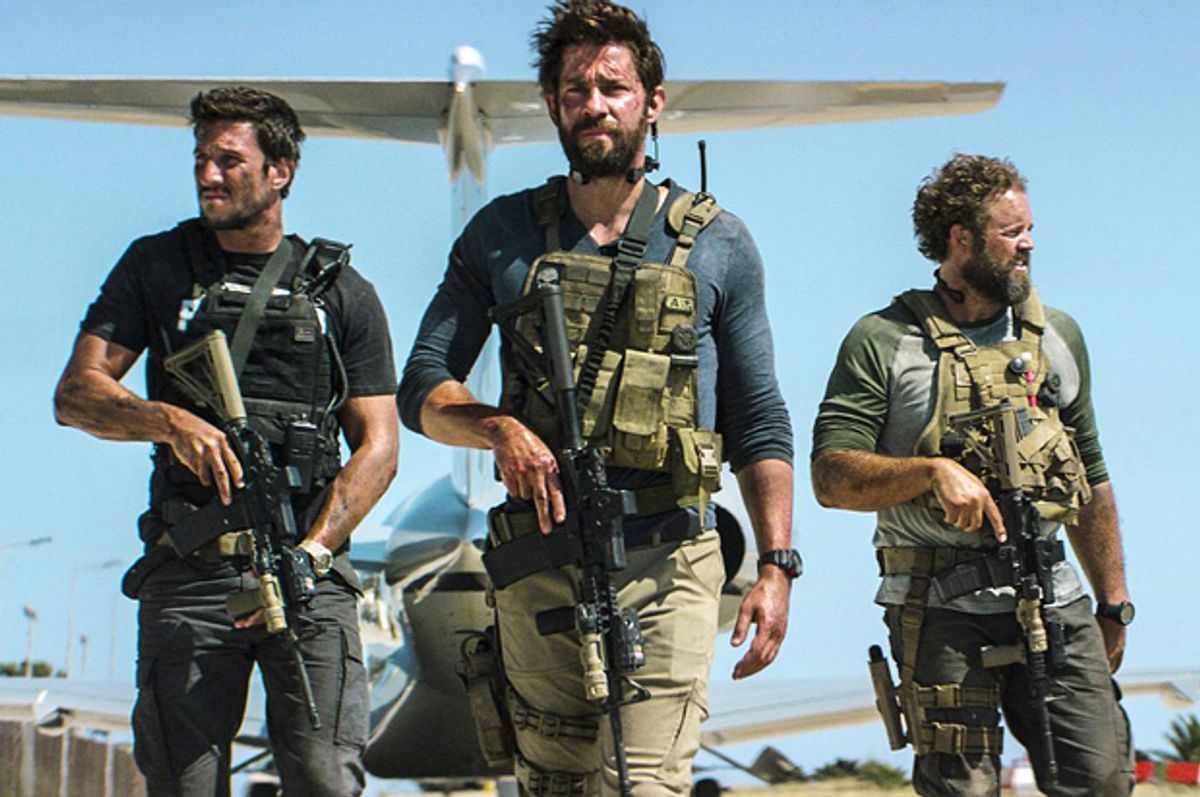Making a movie about Benghazi is a difficult task. There’s a phenomenally interesting story to be told about the deadly 2012 assault on the diplomatic outpost that captures the drama of the attack itself alongside the complicated politics of post-revolution Libya, the idealistic motivations of the diplomatic personnel who got caught up in the tragedy, and the clandestine machinations of American intelligence services on the ground. Telling that story would be a monumental challenge, requiring a filmmaker with a gift for subtlety, a talent for weaving complex stories together, and a sophisticated understanding of the raw politics that still envelop Benghazi like so much concertina wire.
But we didn’t get any of that. Instead, we get Bayhem.
Michael Bay’s “13 Hours: The Secret Soldiers of Benghazi” is a bad movie. And I’m not just talking about the filmmaking, which is bad in the way that most Michael Bay movies are bad – it’s loaded up with frenetic camera work, neck-snapping edits that make it impossible to follow the action, and gratuitous war porn. If you were unfortunate enough to have seen “Pearl Harbor,” Bay’s other steaming pile of reductive patriotism, you may remember this shot, in which the camera trails a Japanese bomb as it spins toward an American warship. “13 Hours” features that exact same shot, only this time the camera follows a Libyan militiaman’s mortar shell on its way to murdering an American security agent.
What makes “13 Hours” especially terrible is the way it crassly exploits the politics surrounding Benghazi. It’s not possible to make a movie about Benghazi that doesn’t carry any political significance, given the right’s enduring obsession with the attacks. But Bay’s film unsubtly pokes at every conspiracy about Benghazi while declaring itself a “true story.”
In “13 Hours,” the chief antagonist isn’t the faceless horde of Libyan terrorists attacking the diplomatic facility – it’s the government that the characters consistently complain isn’t doing anything, represented principally by an impossibly asshole-ish CIA official named Bob. When the shooting starts, Bob stymies the CIA security personnel who attempt to rush to the rescue, barking at them: “Stand down! Stand down! Wait for my word!” (The “stand down” order is an unkillable myth in conservative circles – multiple investigations have concluded that no such order was given, and the real-life “Bob” says it never happened.)
While no character comes right out and says it, the clear message delivered by the film is that the Americans under attack in Benghazi were either ignored or abandoned by the U.S. government. During a lull in the action, Bob explains to security head Tyrone Woods that the Libyan government wasn’t answering the phone, to which Woods replies: “What about ours? They pick up the phone?” In the middle of the seemingly interminable shootout, John Krasinski’s character Jack Silva complains: “Here we got nothing, and no one.” There are shots of American warplanes idling on aircraft carriers, and a character makes an angry telephone call demanding assistance from F-16s, only to be told by an unseen government functionary that she doesn’t have “authority.” After the shooting stops, she tells one of the CIA agents “I called for air support, it never came.” As a Libyan transport taxis on a runway to ferry the last of the survivors out of Libya, one of them gripes: “Still no Americans.”
All this plays right into the conservative Benghazi conspiracy, which presumes that Ambassador Chris Stevens and the rest of the personnel under siege were left to die by the Obama administration, which withheld aid as part of some ill-conceived plan to downplay the incident. The truth of the matter is that military assets were scrambled, but none could arrive in time to make a difference – a fact that has been affirmed by congressional investigations into the attacks.
But it’s just a movie, right? It’s another bullet-riddled, explosion-heavy entrant in the Michael Bay catalog of trashy, puddle-deep action films. It doesn’t have to be rigorously accurate, even if it does claim to be a “true story.” To conservatives and Republicans, however, “13 Hours” is a monumental triumph of filmmaking and a scathing takedown of Hillary Clinton.
At last week’s Republican presidential debate, Ted Cruz mentioned “13 Hours” in his closing statement. The conservative America Rising PAC called “13 Hours” an “indictment of the failed leadership and bad judgment of Secretary Clinton” prior to the private screening it arranged in Washington, DC (Sen. Tom Cotton was among the invitees in attendance). Conservative publications like National Review and Breitbart News offered glowing praise for the film, arguing that it exposes the TRUTH about the government’s non-response to the attack. They all loved it not because it was a good movie, but because it offered the opportunity to bash a political opponent and because it was a two-and-half-hour dog whistle that told a story they wanted to hear.
“13 Hours” is bad, but it fits neatly into the broader politicization of the Benghazi attacks. It’s a selective and twisted presentation of fact that lays a bad-faith claim to the truth. It’s a stylized exploitation of tragedy that tries to bury its excesses under crude appeals to patriotism. It has little value as a piece of moviemaking, but it’s useful as a political weapon, and these days that’s all that matters when it comes to Benghazi.

Shares